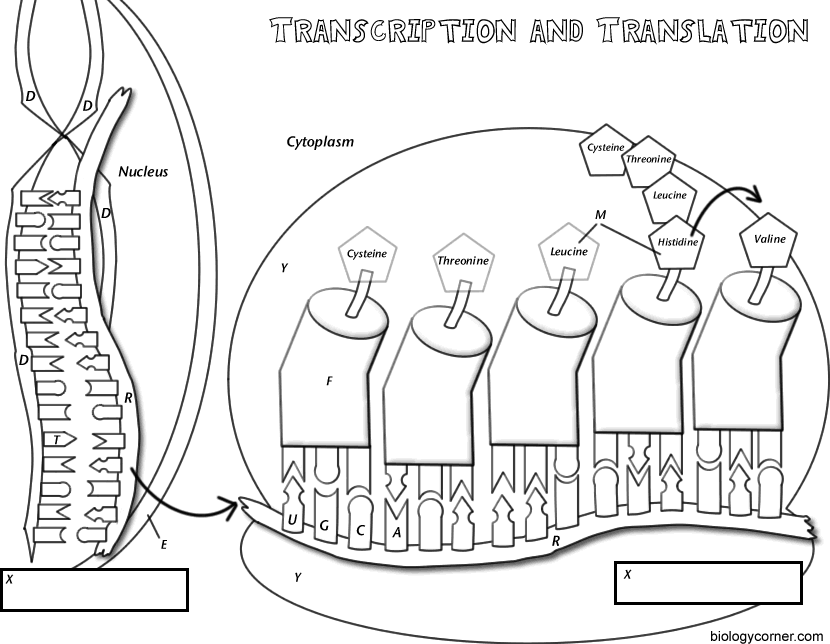DNA Coloring - Transcription & Translation
Transcription
1. RNA, Ribonucleic Acid is very similar to DNA. RNA normally exists as a single strand (and not the double stranded double helix of DNA). It contains the same bases, adenine, guanine and cytosine. However, there is no thymine found in RNA, instead there is a similar compound called uracil.
2. Transcription
is the process by which RNA is made from DNA. It occurs in the nucleus. Label
the box with the x in it near the nucleus with the word TRANSCRIPTION and proceed
to color the bases according to the key below. 
Thymine = orange
Adenine = dark green
Guanine = purple

Cytosine = yellowUracil = brown
Color the strand of DNA dark blue (D) and the strand of RNA light blue (R). Color the nuclear membrane (E) gray.
Translation
1. Translation occurs in the cytoplasm, specifically on the ribosomes. The mRNA made in the nucleus travels out to the ribosome to carry the message of the DNA. Here at the ribosome, that message will be translated into an amino acid sequence. Color the ribosome light green (Y) and note how the RNA strand threads through the ribsosome like a tape measure and the amino acids are assembled. The RNA strand in the translation area should also be colored light blue, as it was colored in the nucleus.
Label the box with the X in the translation area with the word TRANSLATION.
2. Important
to the process of translation is another type of RNA called Transfer RNA (F) which
function to carry the amino acids to the site of protein synthesis on the ribosome.
Color the tRNA red  .
.
3. A
tRNA has two important areas. The anticodon, which matches the codon on the RNA
strand. Remember that codons are sets of three bases that code for a single amino
acid. Make sure you color the bases of the anticodon the same color as the bases
on your DNA and RNA strand - they are the same molecules! 
4. At
the top of the tRNA is the amino acids. There are twenty amino acids that can
combine together to form proteins of all kinds, these are the proteins that are
used in life processes. When you digest your food for instance, you are using
enzymes that were originally proteins that were assembled from amino acids. Each
tRNA has a different amino acid which link together like box cars on a train.
Color all the amino acids (M) orange.

Questions:
1. How many different kinds of bases can be found on DNA _______
2. What base is found on RNA but not on DNA? _____________
3. How many bases are in a codon? ______ In an anticodon? ____________
4. How many amino acids are attached to a single transfer RNA? ________
5. Transcription occurs in the ____________________; translation occurs in the ________________________.
6. The process of making RNA from DNA is called _______________________
7. The process of assembling a protein from RNA is called __________________________.
8. Describe two ways in which RNA differs from DNA: _______________________________________________

Related Resources
Coloring DNA - basic image of DNA and RNA for students to color following directions; includes questions and analysis
Transcription and Translation Labeling - label a diagram showing the processes and answer questions
DNA Detectives: The Case of the Radioactive Phosphorous - a short story about the Hershey Chase experiment with questions.


